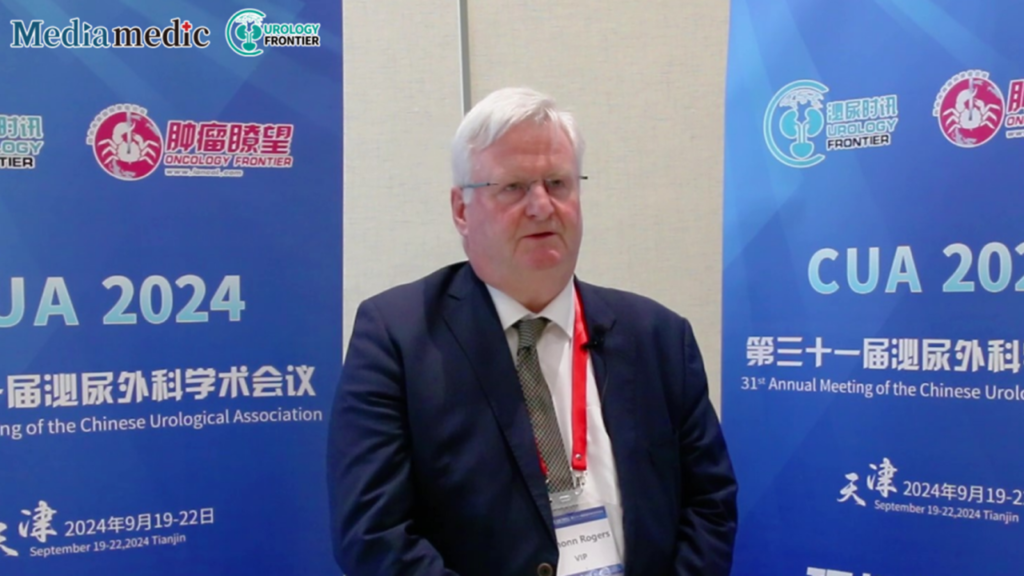
Editor’s Note: Prostate cancer is a common malignant tumor in elderly men. However, with continuous advancements in diagnostic and treatment strategies, patient survival rates have improved, and patient-centered care has become a key focus in oncology. During the recent CUA Annual Meeting, Urology Frontier invited Dr. Eamonn Rogers from the National University of Ireland to share his thoughts on the future of prostate cancer research, the importance of patient-reported outcomes (PROs), and evolving models of care to meet modern medical challenges.1. As a urologic oncologist, what areas of prostate cancer do you think warrant further exploration?
Dr. Eamonn Rogers: Prostate cancer deserves more attention. A recent report in The Lancet predicts that by 2040, both the incidence and mortality rates of prostate cancer will rise sharply. This means that the number of prostate cancer patients will increase significantly, and more men may die from this disease. Although the factors driving this rise remain unclear, we must face the challenges in prostate cancer diagnosis and treatment.
In Europe, possibly due to the influence of media and the internet, patients are becoming more informed about prostate cancer and are increasingly involved in clinical practice. Urologists are also dedicating more time and effort to patient care. Patient-centered care has become widely adopted and is even a legal standard in some regions: not only must patients be informed of their diagnosis, but they must also be told how treatment will impact them personally, as well as their family, partner, and work.
Quality of life is crucial for these patients. As urologists, we must take this into account. How can we communicate this effectively to patients? The European Association of Urology (EAU) has developed a website based on guidelines specifically for patients, and we hope more urologists will use it to inform them. We have also started using more interactive materials, such as animations, which patients enjoy. Our YouTube animations have nearly 15 million views. These interactive tools can facilitate shared decision-making between patients and doctors. Of course, each country will face unique challenges, but we must recognize that patients will have a greater say in their treatment choices. This is one of the major challenges we face moving forward.
2. Patient-reported outcomes (PROs) are receiving increasing attention. How do you think PROs will affect clinical research and practice?
Dr. Eamonn Rogers: Patient-reported outcomes are real-world evidence from the patient’s perspective. Traditionally, urologists assess treatment benefits based on survival rates or disease-free survival. However, patients now feel that this is not enough. A patient advocacy group in Europe is calling for more focus on patients themselves. While our treatments can cure disease, and cure rates are high, the impact of treatment on quality of life must also be considered.
For men in particular, these treatments can affect their sexual health, which in turn may impact their relationships with their partners. Treatments can also affect mental health and social interactions, such as incontinence. Healthcare systems in Europe may soon require PROs as a standard of care, and these outcomes are becoming a key metric in healthcare services. PROs will also have a significant impact on research.
3. You designed and authored Urology: A Model of Care for Ireland. Can you share some insights from this model that could benefit prostate cancer patients, including those in China?
Dr. Eamonn Rogers: Urology: A Model of Care for Ireland is not specifically about prostate cancer but covers the entire field of urology. When I wrote this, all patients had to visit hospitals for urological treatment. Due to a shortage of urologists and limited surgical opportunities, large hospitals faced numerous challenges, resulting in delays in treating conditions like benign prostatic hyperplasia (BPH) or incontinence, which are less urgent.
The basic concept behind Ireland’s care model, aligned with the Irish government’s SláinteCare policy, is to integrate healthcare services with the community. For example, under a new clinical pathway for incontinence patients, the initial diagnosis and treatment are provided by a physiotherapist and an advanced practice nurse under the guidance of a urologist, whenever possible, in the patient’s local community. This reduces wait times, as patients do not need to visit a hospital. We are working to move a significant portion of urological care back to local communities. The primary goal of this care model is to ensure patients receive timely care in the right place, at the right time. We have established various strategies around hematuria, bladder cancer screening, incontinence, and BPH.
Dr. Eamonn Rogers National University of Ireland Dr. Eamonn Rogers specializes in urologic oncology and completed his fellowship training at Baylor College of Medicine in Houston, Texas. He has practiced urology in both the UK and Ireland. He is the National Urology Advisor for the Health Service Executive (HSE) in Ireland. He designed and authored Urology: A Model of Care for Ireland, which outlines care pathways for urological diseases, integrating patient-centered care with value-based healthcare principles.
Professional Affiliations:
- Chair of the European Association of Urology (EAU) Patient Office
- Adjunct Professor of Urology at the University of Illinois College of Medicine, Chicago, USA
- Former President of the Irish Urological Society


